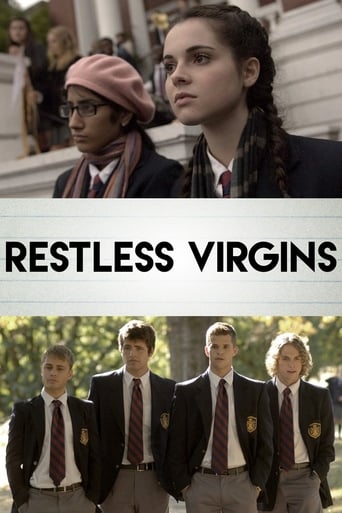BreannaBaker
The first thing that excited me about this show was hearing the voice and seeing the face of April Nardini (Vanessa Marano) from "Gilmore Girls" (one of my favorite TV shows). It's sad to hear that this was a true story. I really don't understand why people do things like this, and it confuses me. I'm glad that Emily and Lucas do the right thing in the end... but the whole situation still shocks me. Emily should never have put anything like that on the internet, and Lucas should never have agreed to be part of such nonsense nor hung out with such people. The relationship between Emily and Lucas is cute, and I love that they accepted each other for who they truly were. One unanswered question was when the boy handed over all the evidence on the SD card, the board went to view it, and they said there was nothing on it... Did the rich kid pay them off too? And if so, I feel that they should have been punished for agreeing to such.
SnoopyStyle
This is a Lifetime movie based on a sex scandal that took place at Milton Academy prep school, Massachusetts in 2005. Things have definitely been changed so don't expect a doc.In the movie, the lacrosse team is a group of bullying boys and they are the top dogs. The school have a ceremony whereby the senior students pass on something to the following classes. In order to top all that has come before, they decide to make a sex tape and pass it on.The young actors do a good job. It stars Vanessa Marano, Max Lloyd-Jones, and Charlie Carver. The story flows very well for the first 2/3. The ending however have a few things that I have questions about.1. The biggest thing that concerned these kids seemed to be expulsion. But it seems that there are bigger criminal issues that was never even touched on. Transmitting underage sex is child pornography, and very chargeable.2. Everybody is willing to lie about the incident with a simple promise of future gifts. Why would this rich guy pay after they finish with the lie? The first thing I would do is get a briefcase filled with cash instead of a handshake promise.3. The boy just handed over all the evidence. Really??? Even an idiot would have made copies.It was good and I like moral ambiguity of all the characters. The ending needed a few more rewrites to iron out some issues.
mgconlan-1
The film was "Restless Virgins," a made-for-TV movie premiered on the Lifetime channel a few weeks ago (March 9) which I'd been interested in watching because it promised some good clean dirty fun about a group of upper-class students at the exclusive Sutton prep school (based on the real Milton Academy in Massachusetts, located eight miles south of Boston) who decide that as their annual "legacy hand-off" to the undergraduates who'll remain there next year after they leave to make a clandestine sex tape, blur out their faces and burn it to DVD. Though not without its flaws — Andy Cochran's script (based on a book by Abigail Jones and Marissa Miley that's listed on IMDb.com as a "novel" even though the film's credits say it was a nonfiction book about a real scandal at Milton in 2005) and Jason Lapeyre's direction occasionally fall into typical Lifetime slovenliness — it's a powerful tale about the sense of entitlement shared by the children of America's 1 percent and the way they believe they can literally do anything they want, no matter how many other people suffer in the process, because their money and their family connections will always be available to bail them out of the consequences the rest of the world has to deal with when they commit similar crimes.There's also another theme: the tension between the people who get to go to schools like Sutton because they're part of America's hereditary ruling class — the principal villain, Dylan Whitman (Charles Carver, whose dark, charismatic handsomeness and whole attitude that the normal rules don't apply to him nail this role to perfection), is referred to as "the son of a billionaire Senator" — and the ones that have got there through scholarships. Anyone who's read George Orwell's essay "Such, Such Were the Days … " will recall his vivid description of how the scholarship boys at elite schools were always made to feel like they didn't really deserve to be there, they were being given this incredible education at the sufferance of both the school authorities and the fellow students whose parents could afford the full tuition, and they were never allowed to forget that even though they had been admitted to this elite institution they were still second-class citizens (with the rest of humanity being considered third-class, or even lesser, citizens). The world of Sutton is a microcosm of the American so-called "meritocracy" — quotes intended because "merit" has little or nothing to do with it; it's really an hereditary aristocracy as hard if not harder to crack than anything Old Europe ever came up with (indeed, modern economic statistics indicate that the U.S. actually has less upward mobility than Western European countries) — in which the class system is overlaid on top of the usual pecking order of a high school, with the popular kids forming cliques and excluding the rest of the student body, while sex and partying are used as ways either to get yourself in with the "in crowd" or to get yourself even more definitively excluded.The central characters, in terms of people who actually display a sense of idealism that clashes with what they know they have to do to get ahead in this foul world, are Emily (Vanessa Marano), a reporter for the school newspaper who narrates the story, and Lucas (Max Lloyd-Jones), who was briefly attracted to Emily until he realized that he couldn't get to the upper-class circle in general and Dylan in particular if he burdened himself with a girlfriend so far down on the pecking order. So instead he started dating Heather (Elise Gatien) and eventually, once he was admitted to Dylan's residential suite, lied that he and Heather were having sex. While all this is happening Dylan and his friends, including oil heir Cotton (Jedediah Goodacre) — whose masculinity is under suspicion since fellow members of the clique caught him looking at Gay porn on a computer — are plotting to shoot their clandestine sex tape, which involves borrowing a special low-light camera from the journalism school and recruiting Madison (Christie Burke) to be their clandestine "star," making it with six guys in a gang-bang she, of course, doesn't know is being filmed. The tape is duly made, and Dylan and friends blur out their own faces so they can't be identified — though Madison is clearly visible and recognizable — and Dylan makes the rest of his posse swear to secrecy. Only one of them leaks the tape to a friend, and soon it goes viral throughout the school and naturally comes to the attention of the school administration."Restless Virgins" is a story that hooks bigger issues than Messrs. Lapeyre and Cochran were aware of, yet their film has a refreshing honesty about just how firm the class barriers are in a so-called "classless society" like ours, and how F. Scott Fitzgerald was right when he said, "The rich are different from you and me" — and how C. Wright Mills documented that the rich are different from you and me because they're trained to be different from birth: they're given an education that trains them to rule over the rest of us and they live in a different culture that shapes their sense of what is important both personally and politically. I guess I didn't think that a Lifetime TV-movie that was sold as a juicy bit of sexploitation would have so much to say about America's classless pretensions and class realities, but Restless Virgins proved to be a lot more than just the two hours (less commercials) of good clean dirty fun I had expected!

